高职高专实用英语教程教案Unit_1-推荐下载
《新理念高职英语实用教程1》(赵元)电子课件 新理念高职英语实用教程(1) 第一单元

recruiting new members, you and your friend want to join in. Since it is the first time to see the members, the host wants everyone to introduce themselves to each other.
M: I am in the Department of _____L_a__w______ and I am a freshman on the campus. How about you?
S: I have been studying here for two years.
M: Really? Could you do me a small favor and show me around? I want to take a tour of the campus.
Unit 1 A Brand New Day
8
TRANSITION PAGE 过渡页
Part
Part
Part
Part
Part
Part
1
2
3
4
5
6
Lead-in
Listening
&
Reading
Speaking
Grammar
Watching & Performing
Applied Writing
1 Listen to the dialogues and fill in the blanks.
Unit 1 A Brand New Day
实用综合教程教案(Unit 1-1)
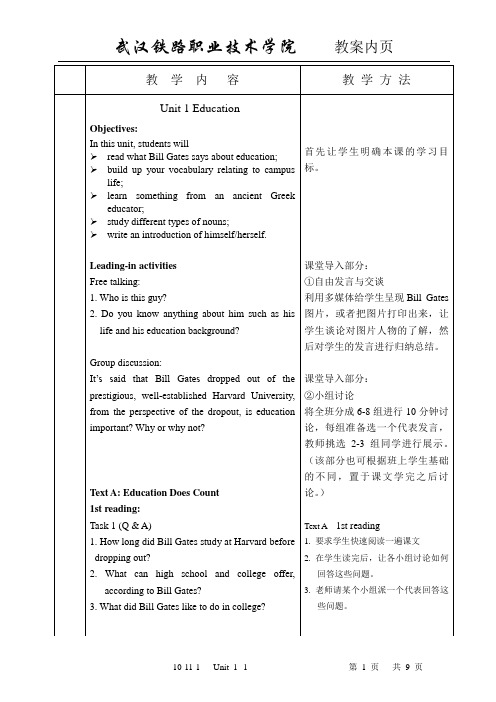
2.Do you know anything about him such as his life and his education background?
Group discussion:
It’s said that Bill Gates dropped out of theprestigious, well-establishedHarvard University, from the perspective of the dropout, is education important? Why or why not?
inlow/poor spirits意志消沉,垂头丧气
12.highly adv.高度地,非常
e.g. a highly interesting story
a highly paid job
speak highly of赞扬,对…给予很高评价
e.g. The leader speaks highly of their work.
3.What did Bill Gates like to do in college?
首先让学生明确本课的学习目标。
课堂导入部分:
自由发言与交谈
利用多媒体给学生呈现Bill Gates图片,或者把图片打印出来,让学生谈论对图片人物的了解,然后对学生的发言进行归纳总结。
课堂导入部分:
小组讨论
将全班分成6-8组进行10分钟讨论,每组准备选一个代表发言,教师挑选2-3组同学进行展示。(该部分也可根据班上学生基础的不同,置于课文学完之后讨论。)
(able).
6.The new machine is____(automatic) controlled.
职高英语基础模块1高等教育unit1教案
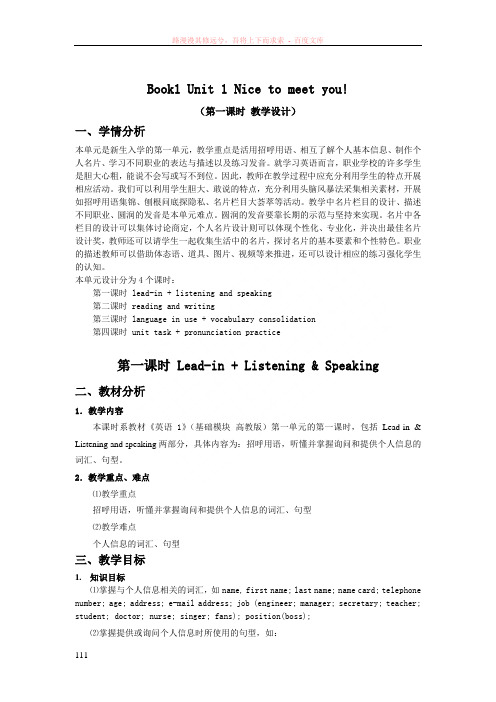
Book1 Unit 1 Nice to meet you!(第一课时教学设计)一、学情分析本单元是新生入学的第一单元,教学重点是活用招呼用语、相互了解个人基本信息、制作个人名片、学习不同职业的表达与描述以及练习发音。
就学习英语而言,职业学校的许多学生是胆大心粗,能说不会写或写不到位。
因此,教师在教学过程中应充分利用学生的特点开展相应活动。
我们可以利用学生胆大、敢说的特点,充分利用头脑风暴法采集相关素材,开展如招呼用语集锦、刨根问底探隐私、名片栏目大荟萃等活动。
教学中名片栏目的设计、描述不同职业、圆润的发音是本单元难点。
圆润的发音要靠长期的示范与坚持来实现。
名片中各栏目的设计可以集体讨论商定,个人名片设计则可以体现个性化、专业化,并决出最佳名片设计奖,教师还可以请学生一起收集生活中的名片,探讨名片的基本要素和个性特色。
职业的描述教师可以借助体态语、道具、图片、视频等来推进,还可以设计相应的练习强化学生的认知。
本单元设计分为4个课时:第一课时 lead-in + listening and speaking第二课时 reading and writing第三课时 language in use + vocabulary consolidation第四课时 unit task + pronunciation practice第一课时 Lead-in + Listening & Speaking二、教材分析1.教学内容本课时系教材《英语1》(基础模块高教版)第一单元的第一课时,包括Lead-in & Listening and speaking两部分,具体内容为:招呼用语,听懂并掌握询问和提供个人信息的词汇、句型。
2.教学重点、难点⑴教学重点招呼用语,听懂并掌握询问和提供个人信息的词汇、句型⑵教学难点个人信息的词汇、句型三、教学目标1.知识目标⑴掌握与个人信息相关的词汇,如name, first name; last name; name card; telephone number; age; address; e-mail address; job (engineer; manager; secretary; teacher; student; doctor; nurse; singer; fans); position(boss);⑵掌握提供或询问个人信息时所使用的句型,如:1) about greeting:Good morning.Hi.Nice to meet you.2) about personal informationWhat’s you name?Where are you from?Which company are you from?2.能力目标⑴学生能听懂关于询问和提供个人信息的对话。
高职高专实用英语教程课件-Unit 1

• have the Indian sign on • 用魔法迷住...; 对...施以魅力
• • • • make a sign to 对...作暗号[打手势] show a sign of 现出...的样子或形迹, 有...的征兆 sign and countersign 口令的问答; 暗语, 暗号 bear the sign of the times 带有时代的特征
• Many children start their education at the age of three or four at a nursery school or in the nursery class at a primary school. Education in the UK is compulsory for every child between the ages of five and sixteen. Both Pre-school and compulsory educations are provided by two kinds of schools: free state-funded schools and fee-charging independent schools. Significant numbers of international students
• • • • •
OverOver-burden Over-charge Overcome overdo
page
• The tournament added a brilliant page to the history of world table-tennis • Paging Grey Wood, would you go to reception please? • 格林伍德先生,请到服务台去一下 • Mr. Black is being paged. • 有人在叫布莱克先生的名字要找他
王守仁主编-高职高专实用综合教程unit1-6教案

4. Over the years, out of sense of respect, Iimagine, I have refused to trouble women with outdated courtesies: I think I have been consciously avoiding treating women with old-fashioned courtesies all these years, simply because I respect them.
Use first names or nicknames among friends;
Use “Mr., Mrs. Or Miss X” foracquaintances or someone one wants to show respect to;
Use “Sir” or “Madam” to address strangers.
在历史上从历史角度看historical历史上的有关历史的historicallessons历史教训historic有历史意义的历史上有名的ahistoricmeeting历史性会议historian历史学家从事历史研究的人4
王守仁主编-高职高专实用综合教程unit1-6教案
大学英语
实用综合教程教案
Use first names among people on close terms with each other;
高职高专实用英语教程教案.docx

高职高专实用英语教程教案.docxUnit 2 StudyLecturer: Liu JunTeaching Objectives:Students (Ss) will be able to:to know about the characteristics of a successful language learner .Know more about word formation.Mastering the key language points and grammatical structures in the text.Be familiar with some conversational strategies in talking about favorite courses.Know translating skill:conversionKnow how to write post cards.Teaching Focus:Vocabulary: subject, diligent, native, stay up, get through, be likely to,challenge, passion, structure, engage, in short, a set of, a range of, assignment, appreciate, do sb. a favor, etc.Dialogue I& II: some conversational strategies in talking about yourfavori te courses and study on campus.Applied writing: Post cardTime Allotment:1st period2nd period3rd- 4th periods5th- 6th periods7th- 8th periodsFurther reading Summary of teWarming-up Ac Pre-reading,xt A; Stylist Further readin.Study languagetivities; Lis While-readin ic comments;g/translationpoints; group dtening and Sp g, Text struc check exercis exercise/writiiscussion, exerceaking ture analysis e; Further re ng Practiceise checkingadingTeaching Methods:ExplanationGroup discussionQuestions and answersMulti-mediaPerformanceTeaching Procedure:1st Period1.Warming-up questions: pair-workGuess: Do you know the meaning of these words?Kowtow, Typhoon, Shanghai, Wonton, Lychee, Mandarin, egg roll, I Ching,Dim sum, Ginseng, Cheong Sam, Oolong, Coolie, Shangri-la Ketchup2.SpeakingTask 1Ask the students to work in pairs and practice sample dialogues1 My favorite subject is?2 discuss any trouble you’ve had with your studiesAsk some pairs to act outTask 2Dividing the students into groups of four or fiveTask 1Ask the students to work in groups and practice sample dialoguesTalk about your favorite subject.Discuss any trouble you’ ve had with your studies.Talk about a coming test.Ask the students to work in groups to1)Understand the short dialogues on Page 26-27 of the Textbook2)To act out3.Focus on Listening1) Word tips:Subject: an area of knowledge which is studied in school, college or university 科目,学科.: Her major subject is chemistry..n.主,主adj.服从的;易患?的;受制于?的vt.使?隶属;使屈从于?Stay up: to go to bed later than usual熬夜.: We stayed up (late) to watch a film..: Often stay up late or be being done is before computer has very great harm to the skinDiligent:adj. careful and using a lot of effort勤的,刻苦的.: Henry is the most diligent student in our class.Get through :pass the exam及格to succeed in talking to someone on the telephone接通to use up or finish something度Be likely to: possibly很可能2) Listening tasks:Short conversations and finish Part B and C on pages 30-40 2nd Period1.Lead-in questions: group discussion1 does you like it easy or difficult to learn English? Why?2 what is your purpose in learning a foreign language?3 how can we learn English well?Let students watch a short film of“Foreigner Learning Chinese” , and c onclude the best way of learning a language:The Key to Successful Learning is熟能生巧2.While-reading Intensive Reading (Text A)1). Pre-reading: Background information:There are many ways to improve your level of English:Read it. Read as many English books, newspapers and magazines as you can find. We also recommend the English version of the monthly magazine READERS DIGEST. It has short stories and articles.Listen to it.Try some of the radio stations,they have very good programs designed to help English learners and teachers.Talk it. Talk to friends who are also learning English. Make a rule that perhapsfor an hour,or when you go out together,you will only speak English to each other! Find native English-speaking people who will give you conversation practice.Look at Other Learning Material on the Web.Browse English-learning websites as often as possible. They offer a lot of online English resources, with audio or visual effects.2)Scan the text as quickly as possible,grasp the opinions of the writer,and answer the following questions:1. Do adults agree that learning a language is easy?2.Can you list three pieces of advice that language teachersoften offer to language learners?3.Do the successful language learners depend on the teacher?4.Why does the author say that successful language learners learn fromtheir mistakes?5.How do the successful language learners deal with difficult communication?6. Which one is more important to a successful language learner: “to learn to think in the language ” or “t o know the meaning of every word ”?7.Why do successful language learners want to learn the language?8.Can you use three adjectives to describe the successful language learners?2) Text OrganizationSkimming the text, students are required to find the top sentences of each paragraph. And try to divide the text into 3 parts and summarize the main idea of each part.Part 1 (Para 1-3): Different people have different opinions of learning aforeign language.Part 2 (Para 4-7): Some suggestions are given for successful language learning.Part 3 (Para 8): Check yourself whether you are learning a language successfully.4. Assignment1.Review the text.2.After-class research: Find more tips on ways to improve your level of English3rd– 4 th Periods1.Warming-up Activities:Ask some students to share their research results with the whole class.2.Brief review of the content of the text/doc/fb8834964.html,nguage points Explain the difficult words and sentences, including language and grammaticalpoints.Focus:Successful: adj. achieving the results wanted or hoped for成功的,有成效的;有成就的,黄达的eg: were you successful in finding a new house?He is a successful writerMore: be successful in success n.succeed v. succeed in doing sth.Guarantee: v. to promise that something will happen or exist 确保;担保,保.: The students are not guaranteed jobs when they graduate We cannot guarantee the punctual arrival of trains in foggy weatherMore: quality guaranteeSimilar: adj. looking or being almost, but not exactly, the same相似的.: my problems are very similar to yoursThese two triangles are similar trianglesMore: be similar to; be similar; in similarityDepend:v. to trust someone or something and know that they will help you ordo what you want or expect them to do 依靠,依;??而定,取决(于)(on/upon) .: the old man depended on his daughter tokeep houseSuccess depends on your effects and abilityMore: dependence n. dependent,dependable a. It depends.Purpose: n. goal, aim目的,意图;用途,效果(pursuit).: the purpose of conducting a business is to make moneyThe purpose of a screen door is to keep flies outRegularly: adv. happening or doing something often定时地,定期地,规则地.: The bookstore regularly gets free publications.Practice speaking the language every dayvt. + doing sthSuch as avoid, consider, delay, dislike, enjoy, escape, excuse, finish, giveup, cannot help, mind, miss, postpone, risk, cannot standThey find it easy to practice using the language regularly because they wantto learn with it.vt. + it + OC + O (to do sth. / that-clause).: They consider it necessary to keep their dorm clean and tidy.I think it a pity that you didn’t try harder.You must keep it in mind that you are a student.2) Explain some difficult sentences,encourage students to paraphrase some sentences.3. Post-reading ExercisesReading comprehension exercises (see textbook P35-37)4.AssignmentReview the phrases and expressionsTry to retell the Reading Text A5th– 6 th Periods1.Lead-inAsk several students to retell the Reading Text A.2.Extensive Reading Text B1)Pre-reading : Questions and DiscussionWhat is the biggest challenge to you during your English learning? Explain.How to develop a passion for learning English?Imagine yourself in the futureRemember that you are already goodUse your English whenever you can2) While-reading: Scanning1.Scanning and find answers to these questions as quickly as possible:1.What is the author ’s long cherished position about the strong points ofthe Internet?2.How did the author start his argumentation?3.When and how did the fragmentation of society begin?4.Why does the author discuss the question whether the Internet is a realplace?5. According to the author, what underlies the trend of overusing the Internet in our society?6.Does the author believe it is within human capacity to reap thebenefit of the Internet without being penalized?3)Structure analysis and Rhetorical features:The argumentation can be divided into 3 parts.Part 1 (Para 1-2): introductionPart 2 (Para 3-7): body of argumentation. Evidence and reasonsPart 3 (Para 8): ConclusionThe author of this text seems to believe that the Internet has both advantagesand disadvantages. This self-contradiction is partly illustrated by the use ofantonyms such as globalization and alienation. Some other pairs of antonyms (including words and expressions) are used for the same purpose.3)Explain some key words and language points in Text B.Focus:Challenge n.挑战;艰巨的任务,努力追求的目标. Life is a challenge, meet it.As the international globalization trend continues,and challenges are emerging in China.Passion n.激情,热情;激怒,激情爆发. His life passion is dancing and drinking.Process n.过程,进程;步骤,方法.:He is quick in his thought processesThink about / think back/ think of/ think well of/ think over/ out/ think aloudRequire v.需要,有赖于;要求,命令(requirement) .:All passengers are required to show their tickets. Engage v.从事,参加;保证,答应engage in / engaged.: At college he engaged in gymnastics.He engaged to pay back the money.Studying engages most of a serious stude nt ’s time.a set of一套,一组,一系列new opportunities think up /think.: We encountered a new set of problems.a range of一排,一行;一系列.: We could see a range of hills in the distance.There is a range of opinions on this issue.The hotel offers a wide range of facilities and services.Improve v.改进,增进;增加,提高(improvement).: The company needs to improve performance in all these areas.5.AssignmentReview the phrases and expressions7th–8th Periods1.Post-reading of T ext BDo the exercises and check the answers.3. Translation Skills: (Conversion )A word in one language belonging to a certain part of speech is notnecessarily to be turned into one of the same part of speech in anotherlanguage. Different expression in English and ChineseFor example: verbsHe admires th e President’s stated decision to fight for the job.他对总统声明为保住其职位而决心奋斗表示钦佩The growing awareness by millions of Africans of their extremely poor andbackward living conditions has prompted them to take resolute measures and create new ones.原译:数以百万计的非洲人对于他们非常贫穷落后的生活条件的日益觉醒促使他们采取坚决的措施,创造新的生活条件。
新编实用英语综合教程2unit-1-教案

dance in oral English.students will fine tune their listening and comprehensionskills through exercises relating to inviting people out.with invitations, when one wants to accept or does not accept.and a reply to the invitation one gets.Patterns and expressions for talking about invitations:I’dliketoinviteyoutodinner.我想请你吃晚饭。
Why don’t you come and join us for disco?你为什么不和我们一起跳迪斯科?It’s very kind of you to invite me.谢谢你邀请我。
How nice of you! Many thanks.你真好!多谢。
I’dlove to. That wouldbe grea t.我很愿意去。
太好了!Oh, dear, I’m afraid I’m busy tonight. Perhaps tomorrow evening?哦,亲爱的,今晚我很忙。
明晚也许可以吧?Could you make it another time, perhaps next Sunday?你能改个时间吗,下个星期天怎样?It’s very kind of you, but you see I’ll have to prepare for my exam.非常感谢,可你知道我得准备考试。
I’m sorry I can’t, but thank you all the same.真抱歉,我不能去。
可还是要谢谢你。
Wouldyoulike to … ?您愿意…吗?I’dlike toinvite youto …我想邀请你参加…?I would like to know if you could come to …?我想知道你是否能来…May I invite you to …?敬请光临…Wouldit be possible tojoinus for… ?请问你是否能光临…?Would it be convenient to take part in …?请问你是否方便参加…?I was wondering if you would be interested in …?不知你是否有兴趣参加…?Thank you. I’ll be happy to come.谢谢.我很高兴接受你的邀请.I’dlove to. That wouldbe grea t.我很愿意去.太好了.Thank you for invitation.谢谢你的邀请.I’dbe gladtocom e.我很高兴前往.I’d love to, but I can’t come.我很想参加,但是不能来.Thank you for your invitation, but I don’t think I can make it.感谢你的邀请,但我恐怕不能赴约.Unfortunately,I’malready busy that day.很遗憾,我那天事情太多了.It’s very kind of you, but you see I’ll have to prepare for my exam.非常感谢,可你知道我得准备考试。
英语综合教程2(高职高专英语专业适用)Unit 1课件(text B)
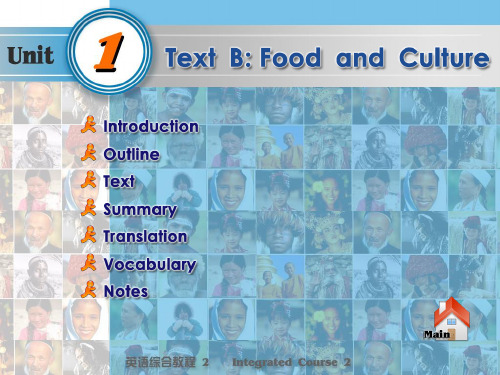
Para 5
Another example is that Americans do not eat dogs, although people from some other cultures regard them as good food. In the United States, dogs are very important to people as pets. They are usually regarded as part of the family, almost like a child in some cases. In addition, dogs have value as protection against criminals. Thieves will not usually enter a house where there is a dog because the dog will bark and possibly attack a stranger who is trying to get into a house. Apparently, the dog’s place in society as a companion and as a protection against criminals makes the dog taboo as food.
Para 7
Anthropologists believe that most food likes and dislikes are a result of the ways of life of different people. Some people live in areas where there are both large animals and many insects. It is difficult for these people to kill large animals, and it requires a lot of energy. It is easier for them to use insects for food because it is not difficult to catch insects and it does not require a lot of energy. Nomadic people who move around will not want to keep pigs for food. People will not eat pets such as dogs. Americans eat a lot of beef because there is plenty of land for raising cattle and their meat can be shipped cheaply for long distances by railroads.
高职高专实用英语Unit1_Text_A

Choose the right intermediary,选择正确中介 study employment policy,学习就业政策 Resume,简历 Interview,面试 Self-analysis,自我分析
Network,关系网
1. For many students, part-time or vacation work has become an integral part of student life. As well as easing financial pressures, a well-chosen job can provide excellent work experience. Summer holiday is such a long holiday period that you cannot stay at home without anything to do. Why not make an action plan for your summer job?
由此可见,在这种情况下,译 成中文时,要先译as well as之后 的词,再译它之前的词。
1.She is hardworking as well as clever. 她不但聪明,而且用功。(强调“用功”) 2.She is not only hardworking but also clever. 她不但用功,而且聪明。(侧重“聪明”) 3.He has experience as well as knowledge. 他既有知识又有经验。(强调“经验”,注意语序) He has not only knowledgebut also experience . He has both knowledge and experience .
高职高专英语第一册教案

Unit 1 Why English Is So Widely Spread?I. Teaching Objectives:After the learning of this text, the students will be able to1. understand the main idea of the text (English is widely spread in the world);2. learn to analyse long difficult sentence patterns;3. grasp the key words, language points and grammatical structures in the text;4. conduct a series of reading, speaking and translation exercises related to the text. II. Time Allotment:Eight periods (six for intensive reading and two for Exercises)III. Text Analysis1. The English language is used by more people in the world than any other living languag e today.living在使用中,实践着的,活动中的living language现用的语言a living hope, faith, realit y现存的希望,仍在信奉的信仰,活生生的现实2. …the majority of people in the United States, Canada, Australia and New Zealand are also native English-speakers.majority: 多数,大多数e.g. The majority of people realize the importance of limiting population growth.大多数人认识到限制人口增长的重要性。
新标准高职公共英语实用综合教程(第二版)unit1

《实用综合教程(第二版)》第2册电子教案
Unit 1 Blue-Collar Workers
Background Information
Discussion
Blue-collar workers A blue-collar worker is a member of the working class who performs manual labor. Blue-collar work may involve skilled or unskilled, manufacturing, mining, construction, mechanical, maintenance, technical installation and many other types of physical work. Blue-collar work is often paid hourly wage-labor, although some professionals may be paid by the project or salaried. There is a wide range of payscales for such work depending upon field of specialty and experience.
《实用综合教程(第二版)》第2册电子教案
Unit 1 Blue-Collar Workers
Listening
Speaking
1. M: What is a qualified blue-collar worker like in your mind? W: Well, many things are important, but, to me, skills come first. Q: What does the woman think is the most important quality for blue-collar workers? 2. M: Do blue-collar workers have to work many hours every day? W: Depends. Some blue-collar workers may have more free time than white-collar workers. Q: Is it the case that blue-collar workers’ daily work lasts very long, according to the woman?
最新版创新高职英语基础教程实用2册精品电子教案Unit 1

• Skimming is reading a text quickly to get a general idea of meaning. It can be contrasted with scanning, which is reading in order to find specific information, e.g. figures or names. • Example: A student approaches the above text by looking at the title, introductions, and any diagrams and sub-headings, then skim reading to get a clear general idea of what the text is about. • Scanning is reading a text quickly in order to find specific information, e.g. figures or names. It can be contrasted with skimming, which is reading quickly to get a general idea of meaning. • Example: A student needs to scan a text on Modes of communication quickly to find out if a series of statements about Modes of communication are true or false.
Main topic---The story of my Valentine’s Day and Dad
新标准高职公共英语实用综合教程(第二版)unit1ppt课件

Unit 1 Blue-Collar Workers
Background Information Discussion
Blue-collar workers A blue-collar worker is a member of the working
class who performs manual labor. Blue-collar work may involve skilled or unskilled, manufacturing, mining, construction, mechanical, maintenance, technical installation and many other types of physical work. Blue-collar work is often paid hourly wage-labor, although some professionals may be paid by the project or salaried. There is a wide range of payscales for such work depending upon field of specialty and experience.
Unit 1 Blue-Collar Woaking
I. Listening
A. Choose the best answer according to what you hear.
Script
1. A. They must be knowledgeable. B. They must be hard-working. C. They must be talented. D. They must be skilled.
【免费下载】高职高专实用英语1教案

教案2012 /2013 学年,第 1 学期任课教师课程名称高职高专实用英语教程1本学期学时数64专业、班级11级财经系学生用教科书:高职高专实用英语教程1(学生用书)学生用参考书:综合英语教程1(教师用书)教案:教案是教师以章节或每次课为单元,根据教学大纲和教学内容,针对不同层次、不同专业学生,对授课的知识群和知识点进行思考设计,周密组织编写出的整个教学过程方案。
教案也是具体授课的计划,是实施教学过程的演义方案。
它反映了教师的教学水平、教学思路、教学经验和自身素质,反映了教师钻研教学大纲、熟悉教材、拓展知识、准确把握教学方式方法和责任心的程度。
要求:1.教案作为教学实施文件,应在充分备课的基础上对教学目的、主要内容、重点、难点、学时分配及教学方式方法做出具体设计。
2.教案的编写要按章(节)或每次课为单元。
3.关于讲课方式方法,主要包括:传统教学、多媒体电子课件教学,其中某节采用讨论式、现场教学、或是放录像、放录音,听力训练、习题课等。
第 1 章(次):Unit 1 本章(次)学时数:6主要内容:My First Job, Greeting and farewell重点:run, offer, except for, figure, promote, you’d better, how about, as far as … is concerned, take a day off, bring in, beam难点:This/That be + n. or adj.讲授方式方法及要求:To learn expressions of greetings and farewell by acting out the dialogues;To improve skills of reading, listening, writing, translation and speaking through the study of the text and the exercises第 2 章(次):Unit 2 本章(次)学时数:6主要内容:American Homes and British Homes, Introducing self and others; identifying objects/persons重点:so (consequence), also, too, nouns of household objects, move, afford, atmosphere, occupy, private, block, go up, pay back难点This/That + noun/ possessives第1页讲授方式方法及要求:To learn expressions of introducing others/oneself and identifying objects/persons by acting out the dialogues.To improve skills of reading, listening, writing, translation and speaking through the study of the text and the exercises.第 1 章(次): Unit 1 本章(次)学时数:6主 要 内 容:My First Job, Greeting and farewell 重 点:run, offer, except for, figure, promote, you’d better, how about, as far as … is concerned, take a day off, bring in, beam难 点: This/That be + n. or adj.讲授方式方法及要求:To learn expressions of greetings and farewell by acting out the dialogues;To improve skills of reading, listening, writing, translation and speaking through the study of the text and the exercises第 2 章(次): Unit 2 本章(次)学时数:6主 要 内 容:American Homes and British Homes, Introducing self and others; identifying objects/persons重 点:so (consequence), also, too, nouns of household objects, move, afford, atmosphere, occupy, private, block, go up, pay back难点This/That + noun/ possessives第 3 章(次):Unit 3 本章(次)学时数:6主要内容:What is in a name, Describing an object/people; talking about one’s job重点:Adjectives for describing objects, people难点:NP + be + adj/Np讲授方式方法及要求:To learn expressions of describing an object and asking about one’s job by acting out the dialogues.To improve skills of reading, listening, writing, translation and speaking through the study of the text and the exercises第 4 章(次):Unit 4 本章(次)学时数:6主要内容:Doing Away with the King’s English, Getting & giving information重点:do away with (other do usage, a. do + nouns; b. do + prep. phrases), … way (manner and method), update, drop难点:There + be + preposition of location讲授方式方法及要求:To learn expressions of asking for and giving information by acting out the dialogues; To improve skills of reading, listening, writing, translation and speaking through the study of the text.第2页第 5 章(次):Unit 5 本章(次)学时数:6主要内容:England as Seen by Americans, Giving and asking for reasons重点:inquisitive, enthusiastic, average, lead (v), take (understand)难点:Irregular nouns讲授方式方法及要求:To learn expressions of asking for and giving reasons by acting out the dialogues;To improve skills of reading, listening, writing, translation and speaking through the study of the text and the exercises.第 6 章(次):Unit 6 本章(次)学时数:6主要内容:The First Day at School, Making suggestions重点:Prepositions in, at, on, by + nouns of some idiomatic usage; words and phrases of educational matters难点:Use of Prep第3页第4页讲授方式方法及要求:To learn expressions of asking for and making suggestions by acting out the dialogues;To improve skills of reading, listening, writing, translation and speaking through the study of the text and the exercises 。
高职高专实用英语教程教案.docx
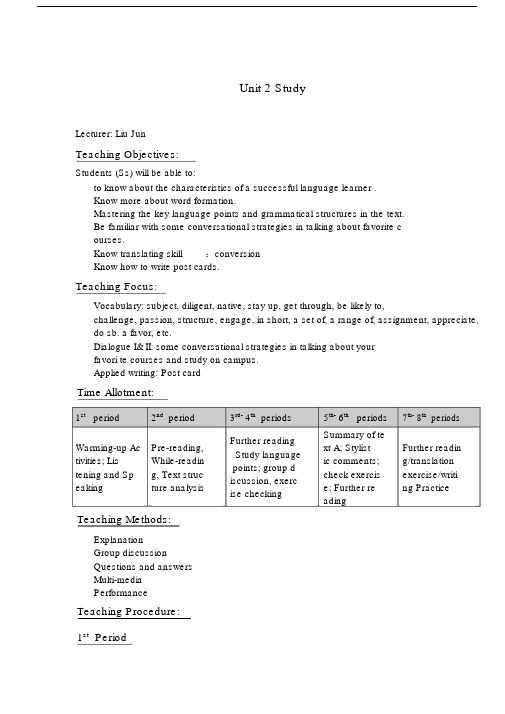
Unit 2 StudyLecturer: Liu JunTeaching Objectives:Students (Ss) will be able to:to know about the characteristics of a successful language learner .Know more about word formation.Mastering the key language points and grammatical structures in the text.Be familiar with some conversational strategies in talking about favorite courses.Know translating skill:conversionKnow how to write post cards.Teaching Focus:Vocabulary: subject, diligent, native, stay up, get through, be likely to,challenge, passion, structure, engage, in short, a set of, a range of, assignment, appreciate, do sb. a favor, etc.Dialogue I& II: some conversational strategies in talking about yourfavori te courses and study on campus.Applied writing: Post cardTime Allotment:1st period2nd period3rd- 4th periods5th- 6th periods7th- 8th periodsFurther reading Summary of teWarming-up Ac Pre-reading,xt A; Stylist Further readin.Study languagetivities; Lis While-readin ic comments;g/translationpoints; group dtening and Sp g, Text struc check exercis exercise/writiiscussion, exerceaking ture analysis e; Further re ng Practiceise checkingadingTeaching Methods:ExplanationGroup discussionQuestions and answersMulti-mediaPerformanceTeaching Procedure:1st Period1.Warming-up questions: pair-workGuess: Do you know the meaning of these words?Kowtow, Typhoon, Shanghai, Wonton, Lychee, Mandarin, egg roll, I Ching,Dim sum, Ginseng, Cheong Sam, Oolong, Coolie, Shangri-la Ketchup2.SpeakingTask 1Ask the students to work in pairs and practice sample dialogues1 My favorite subject is⋯2 discuss any trouble you’ve had with your studiesAsk some pairs to act outTask 2Dividing the students into groups of four or fiveTask 1Ask the students to work in groups and practice sample dialoguesTalk about your favorite subject.Discuss any trouble you’ ve had with your studies.Talk about a coming test.Ask the students to work in groups to1)Understand the short dialogues on Page 26-27 of the Textbook2)To act out3.Focus on Listening1) Word tips:Subject: an area of knowledge which is studied in school, college or university 科目,学科.: Her major subject is chemistry..n.主,主adj.服从的;易患⋯的;受制于⋯的vt.使⋯隶属;使屈从于⋯Stay up: to go to bed later than usual熬夜.: We stayed up (late) to watch a film..: Often stay up late or be being done is before computer has very great harm to the skinDiligent:adj. careful and using a lot of effort勤的,刻苦的.: Henry is the most diligent student in our class.Get through :pass the exam及格to succeed in talking to someone on the telephone接通to use up or finish something度Be likely to: possibly很可能2) Listening tasks:Short conversations and finish Part B and C on pages 30-402nd Period1.Lead-in questions: group discussion1 does you like it easy or difficult to learn English? Why?2 what is your purpose in learning a foreign language?3 how can we learn English well?Let students watch a short film of“Foreigner Learning Chinese” , and conclude the best way of learning a language:The Key to Successful Learning is熟能生巧2.While-reading Intensive Reading (Text A)1). Pre-reading: Background information:There are many ways to improve your level of English:Read it. Read as many English books, newspapers and magazines as you can find. We also recommend the English version of the monthly magazine READERS DIGEST. It has short stories and articles.Listen to it.Try some of the radio stations,they have very good programs designed to help English learners and teachers.Talk it. Talk to friends who are also learning English. Make a rule that perhapsfor an hour,or when you go out together,you will only speak English to each other! Find native English-speaking people who will give you conversation practice.Look at Other Learning Material on the Web.Browse English-learning websites as often as possible. They offer a lot of online English resources, with audio or visual effects.2)Scan the text as quickly as possible,grasp the opinions of the writer,and answer the following questions:1. Do adults agree that learning a language is easy?2.Can you list three pieces of advice that language teachers often offer to language learners?3.Do the successful language learners depend on the teacher?4.Why does the author say that successful language learners learn fromtheir mistakes?5.How do the successful language learners deal with difficult communication?6. Which one is more important to a successful language learner: “to learn to think in the language ” or “to know the meaning of every word ”?7.Why do successful language learners want to learn the language?8.Can you use three adjectives to describe the successful language learners?2) Text OrganizationSkimming the text, students are required to find the top sentences of each paragraph. And try to divide the text into 3 parts and summarize the main idea of each part.Part 1 (Para 1-3): Different people have different opinions of learning aforeign language.Part 2 (Para 4-7): Some suggestions are given for successful language learning.Part 3 (Para 8): Check yourself whether you are learning a language successfully.4. Assignment1.Review the text.2.After-class research: Find more tips on ways to improve your level of English3rd– 4 th Periods1.Warming-up Activities:Ask some students to share their research results with the whole class.2.Brief review of the content of the textnguage pointsExplain the difficult words and sentences, including language and grammaticalpoints.Focus:Successful: adj. achieving the results wanted or hoped for成功的,有成效的;有成就的,黄达的eg: were you successful in finding a new house?He is a successful writerMore: be successful in success n.succeed v. succeed in doing sth.Guarantee: v. to promise that something will happen or exist确保;担保,保.: The students are not guaranteed jobs when they graduateWe cannot guarantee the punctual arrival of trains in foggy weatherMore: quality guaranteeSimilar: adj. looking or being almost, but not exactly, the same相似的.: my problems are very similar to yoursThese two triangles are similar trianglesMore: be similar to; be similar; in similarityDepend:v. to trust someone or something and know that they will help you ordo what you want or expect them to do 依靠,依;⋯⋯而定,取决(于)(on/upon) .: the old man depended on his daughter to keep houseSuccess depends on your effects and abilityMore: dependence n. dependent,dependable a. It depends.Purpose: n. goal, aim目的,意图;用途,效果(pursuit).: the purpose of conducting a business is to make moneyThe purpose of a screen door is to keep flies outRegularly: adv. happening or doing something often定时地,定期地,规则地.: The bookstore regularly gets free publications.Practice speaking the language every dayvt. + doing sthSuch as avoid, consider, delay, dislike, enjoy, escape, excuse, finish, giveup, cannot help, mind, miss, postpone, risk, cannot standThey find it easy to practice using the language regularly because they wantto learn with it.vt. + it + OC + O (to do sth. / that-clause).: They consider it necessary to keep their dorm clean and tidy.I think it a pity that you didn’t try harder.You must keep it in mind that you are a student.2) Explain some difficult sentences,encourage students to paraphrase some sentences.3. Post-reading ExercisesReading comprehension exercises (see textbook P35-37)4.AssignmentReview the phrases and expressionsTry to retell the Reading Text A5th– 6 th Periods1.Lead-inAsk several students to retell the Reading Text A.2.Extensive Reading Text B1)Pre-reading : Questions and DiscussionWhat is the biggest challenge to you during your English learning? Explain.How to develop a passion for learning English?Imagine yourself in the futureRemember that you are already goodUse your English whenever you can2) While-reading: Scanning1.Scanning and find answers to these questions as quickly as possible:1.What is the author ’s long cherished position about the strong points ofthe Internet?2.How did the author start his argumentation?3.When and how did the fragmentation of society begin?4.Why does the author discuss the question whether the Internet is a realplace?5. According to the author, what underlies the trend of overusing the Internet in our society?6.Does the author believe it is within human capacity to reap thebenefit of the Internet without being penalized?3)Structure analysis and Rhetorical features:The argumentation can be divided into 3 parts.Part 1 (Para 1-2): introductionPart 2 (Para 3-7): body of argumentation. Evidence and reasonsPart 3 (Para 8): ConclusionThe author of this text seems to believe that the Internet has both advantagesand disadvantages. This self-contradiction is partly illustrated by the use ofantonyms such as globalization and alienation. Some other pairs of antonyms (including words and expressions) are used for the same purpose.3)Explain some key words and language points in Text B.Focus:Challenge n.挑战;艰巨的任务,努力追求的目标. Life is a challenge, meet it.As the international globalization trend continues,and challenges are emerging in China.Passion n.激情,热情;激怒,激情爆发. His life passion is dancing and drinking.Process n.过程,进程;步骤,方法.:He is quick in his thought processesThink about / think back/ think of/ think well of/ think over/out/ think aloudRequire v.需要,有赖于;要求,命令(requirement) .:All passengers are required to show their tickets. Engage v.从事,参加;保证,答应engage in / engaged.: At college he engaged in gymnastics.He engaged to pay back the money.Studying engages most of a serious stude nt ’s time.a set of一套,一组,一系列new opportunities think up /think.: We encountered a new set of problems.a range of一排,一行;一系列.: We could see a range of hills in the distance.There is a range of opinions on this issue.The hotel offers a wide range of facilities and services.Improve v.改进,增进;增加,提高(improvement).: The company needs to improve performance in all these areas.5.AssignmentReview the phrases and expressions7th–8th Periods1.Post-reading of Text BDo the exercises and check the answers.3. Translation Skills: (Conversion )A word in one language belonging to a certain part of speech is notnecessarily to be turned into one of the same part of speech in anotherlanguage. Different expression in English and ChineseFor example: verbsHe admires th e President’s stated decision to fight for the job.他对总统声明为保住其职位而决心奋斗表示钦佩The growing awareness by millions of Africans of their extremely poor andbackward living conditions has prompted them to take resolute measures and create new ones.原译:数以百万计的非洲人对于他们非常贫穷落后的生活条件的日益觉醒促使他们采取坚决的措施,创造新的生活条件。
新编实用英语综合教程1一单元教案

Homework--- Ex. 5-6, P10.
计划布置 作
业
Ex.5, P10.
布
置
知识点
时间
10’
78’
2’
实际布置
Ex.5, P10.
课 后 自 评
2
教学提示
教案内容
备课内容(教学设计、知识点、课堂组织、教学方法等)
Unit One: Greeting and Introducing People (1)
课型
■ 理论 □ 讨论 □ 习题 □ 实验 □ 技能训练 □ 设计 □ 实习
授 授课班级 课 监理 1003/1104
时 地隧 1101/1102 间
周次 6 6
星期 6 6
节次 2 2
日期 2011/10/8 2011/10/8
教学效果
教 学 目 标 设 计
学 生 基 础 分 析
教 材 分 析
教 法 选 择
7. call 8. acquaint
课堂组织
Unit One: Passage 1
Difficult Sentences 1. The Way Americans Greet 2. Speaking of…time, I’ve got to run. 3. “Glad to meet you. I’m Miller. But call me Paul.” 4. But Americans do sometimes ask such questions. 5. In this way they can get better acquainted with you
湖北国土资源职业学院
教案
2011 - 2012 学年 第一学期
高职高专实用英语教程教案Unit_1
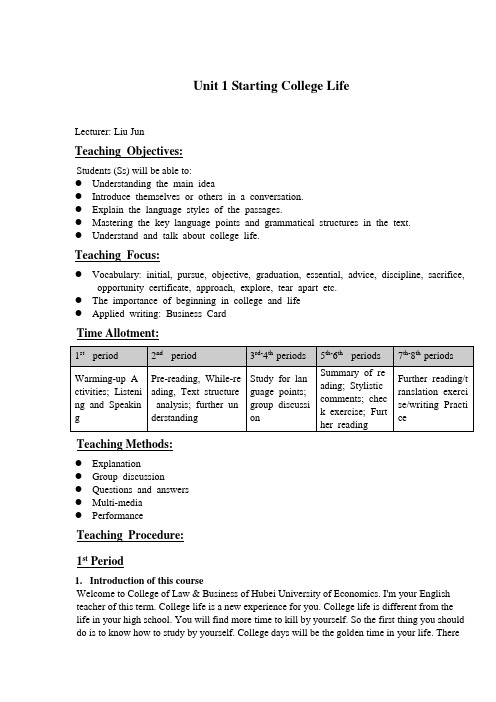
Unit 1 Starting College LifeLecturer: Liu JunTeaching Objectives:Students (Ss) will be able to:●Understanding the main idea●Introduce themselves or others in a conversation.●Explain the language styles of the passages.●Mastering the key language points and grammatical structures in the text.●Understand and talk about college life.Teaching Focus:●Vocabulary: initial, pursue, objective, graduation, essential, advice, discipline, sacrifice,opportunity certificate, approach, explore, tear apart etc.●The importance of beginning in college and life●Applied writing: Business CardTime Allotment:Teaching Methods:●Explanation●Group discussion●Questions and answers●Multi-media●PerformanceTeaching Procedure:1st Period1.Introduction of this courseWelcome to College of Law & Business of Hubei University of Economics. I'm your English teacher of this term. College life is a new experience for you. College life is different from the life in your high school. You will find more time to kill by yourself. So the first thing you should do is to know how to study by yourself. College days will be the golden time in your life. Thereis a saying, “God will help those who help themselves.” This first unit we are going to learn some tips for you to begin your college life.Introduction of This Course:Teaching objects:Students in the Vocational and Three-year CollegesTeaching ideas:Focus on applicationTeaching MaterialPractical English for Vocational CollegesClass Hours:The Term Grade Evaluation SchemeFinal Examination 60%Attendance 10%Classroom Performance 30%2.Warming-up Activities:1) Group discuss/ pair workWhen confident high school students enter college, a whole new life is in front of you, a new battlefield to conquer…Video 1: Colorful College lifeDiscuss the following questions with your partners:•Where are you from?•What are your expectations of college life?•What kind of changes do you think it will bring upon your life?Practical English for Vocational Colleges (Book 1)高职高专实用英语综合教程教案(Book 1)2) Information related.Topics of College Life•Classes•Professors/Advisors•Books•Dorm Life•Student Clubs & Organizations•Specialty•Campus Safety•Tips and Advice3.speakingWork in pairs and act the dialogues to the whole class.Task 1: Meeting with a foreign student and talking about studies, try to introduce yourself to your classmates.Tips:Glad to meet you.Where are you from?Which are you in?I’m majoring in …Task 2: Helping a foreign friend select his course at the registration officeTips:Do you know how to register for online courses?What course do you like most?4.Focus on Listening1) Word tips:Register for: to put someone’s or something’s name on an official list.e.g.: How many students have registered for English class?Credit: a unit which represents a successfully finished part of an educational course.[U] Praise, approval or honore.g.: I gave him credit for (= thought that he would have) better judgment than he showed.Credit Card: a small card which can be used as a method of payment, the money being taken from you at a later timeDorm/dormitory:Major in/at: the most important subject that a college or university student is studying.e.g.: What is your major, English or French?She was a philosophy major at an Ivy League college.2) Listening tasks:Short conversations and finish Part B and C on page 6.2nd Period1. Lead-in questions:What do you expect to learn at college?What kind of life did you expect to have before you came here?What do you expect to learn? More book knowledge or more practical social experience? Students are required to discuss the questions in pairs and then some of them were asked to report the results of the discussion.2. Intensive Reading (Text A) Pre-reading:The teacher asks the following questions:1)What’s college life like in your eyes?2)Do you think there are any differences between college and high school?3)What’s your plan for your college life?Background informationGive brief introduction of some famous universities in the U.S.3. While-reading1) Scanning and find answers to these questions as quickly as possible:1.According to the passage what kind of feeling a student will feel if he has a chance to goto college?2.What have most of you decided on when you go to college?3.Why is the initial decision very important?4.What’s the advice the author always gives to students?5.Why will it be a waste to all of the people if you limit your collegeexperience?6.How will you be exploring many of the disciplines?7.What can be established to a great extent in college?8.Is it necessary to commit yourself and stand by that commitment as you stand at theentrance of your college career?2) Intensive ReadingUnderstand the general organization of the text. Students are required to get the main idea of the text and each paragraph. (Refer to Reading Comprehension Exercise)4. Assignment1. Review the text.2. Oral passage: My ideal college life.3rd– 4th Periods1.Warming-up Activities:1)Ask some students to share their oral passage with the whole class.2)Brief review of the Reading Text A.2. Language points1) Explain the difficult words and sentences, including language and grammatical points.Practical English for Vocational Colleges (Book 1)高职高专实用英语综合教程教案(Book 1)Focus:●Experience n.经历,阅历;经验,体验E.g.-She may lack experience, but learns very quickly. 她可能经验欠缺,但学得很快- He experienced great difficulty in getting a visa to leave the country. 他申请出国签证经历了很大的困难。
高职高专实用英语教程教案unit

Unit 6 HobbiesLecturer: Cai JieTeaching Objectives:Students (Ss) will be able to:Have a deeper understanding about different shopping behavior of men and women.Mastering the key language points and grammatical structures in the text.How to talk about one’s hobbies.Master the Grammar of TensesTranslating skill:Translation of TensesWriting and replying to Invitation Letters.Teaching Focus:Vocabulary: enrich, be crazy about doing, assistant, in stock, promptly, proceeds, lightly, substitute, persuade, patience, opposite, companion, in advance, toone’s satisfaction, base…on / upon, in every respect, make up one’s mind, strength, exactly, poverty, go back to liquid, estate, suffer from, be equal to, before long etc.How to talk about one’s hobbies.Master of the grammar of TensesTime Allotment:1st period2nd period3rd-4th periods5th-6th periods7th-8th periodsWarming-up Ac tivities; Lis tening and Sp eaking Pre-reading, While-reading, Text structure analysis; further understandingStudy for language points;group discussion, exercise checkingSummary of reading; Stylistic comments;check exercise; Further readingFurther reading/translationexercise/writing PracticeTeaching Methods:ExplanationGroup discussionQuestions and answersMulti-mediaPerformance Teaching Procedure:1st Period1. Warming up for the new class:What do you enjoy doing the mostAre your hobbies good for your work or health Try to explain.3.SpeakingDividing the students into groups of four or fiveTask 1Ask the students to work in groups and practice sample dialoguesTalk about your favorite outdoor activities with your partner.Talk about one of your favorite movies with your partner.Talk about one of your favorite sports with your partner.Ask the students to work in groups to1) Understand the short dialogues on Page 121-122 of the Textbook2) To act outTask 2Work in pairs and make a short dialogue based on the information given below. My HobbiesListening to pop songs sung by…Listening to famousHow to Enjoy My HobbiesListening to the radioListening to an MP3 playeAct out in front of the class4Focus on Listening1) Word tips:prefer宁愿,更喜欢prefer sth.prefer sth. above all othersprefer A to Bprefer doing A to doing Bprefer to do sth.prefer doing sth.prefer to do sth. rather than do sth.prefer+that-clauseenrich v. to improve the quality of something by adding something else . Reading can enrich your mind.. I have more time to enrich myself/learn more.be crazy about doing sth. 为……疯狂. The boy has been crazy about computer games for a year.2) Finish the exercise of listening comprehension on page 124-1252nd Period1. Lead-in story:Is there any gender difference in the shopping behaviors of men and womenGive students a short video of FIVE minutes to talk about the different habitsof men a nd women, and ask students to discuss the differences after watching it.2. Intensive Reading (Text A) Pre-reading:After the lead-in story and questions, the teacher asks the students to look at the theme of Text A and try to answer the questions as follow:1. Do men and women have the same experience when they shop2. What do you usually buy while shopping3. What is your mother’s shopping behavior3rd– 4th Periods1.Warming-up Activities:Ask some students to share their oral passage with the whole class.1. shopping for clothes is the same e xperience for a man a s it is for a woman, i sn’t it2. Why does a man go shopping3. Why can a man simply walk into a shop and ask the assistant for what they want4. “If the shop has it in stock, the salesman promptly produces it.” In this sentence,what does “produce” mean5. What does the name “salesman” imply6. What is a woman’s shopping based on7. Does a woman buy clothes in haste8. Why d o the husbands just wait but not involve in their wives’ shopping2. While-reading (Text A)1) Text OrganizationAfter scanning the whole text, students are required to find the top sentences of each paragraph.And try to divide the text into 3 parts and summarize the main idea of each part.Part 1 (Para 1-2): Men’s shopping behavior. A man goes shopping because he needs something.Part 2 (Para 3): Women’s shopping behavior. A woman goes shopping often for leisure instead of buying what they need.3). Language pointsExplain the difficult words and sentences, including language and grammatical points.Focus:in advance: before a particular time, or before doing a particular thing. If you’re going to come, please let me know in advance.. They finished the task in advance.. Is it cheaper if we buy our tickets in advanceconsideration [U]. when you think about something carefully. The whole matter needs careful consideration.take sth. into consideration. Time factor is what we must first take into consideration.in stock 有现货,有存货. We don't have the book in stock but we can order it.in store 贮藏着;准备着, 将要发生promptly: quickly, without delay. We’ll have to leave fairly promptly if we want to catch that train.. So that we can promptly help you to solve the problem!proceed v. to continue as planned. The work is proceeding according to plan.proceed to do…. She sat down and proceeded to tell me about her skiing holiday.proceed with sth.. Please proceed with what you are doing.. Tell us your name and then proceed with your story.proceed from …. All these evils proceed from war.in this/that case 既然这样/ 那样,假若这样/ 那样. In this case, price is an important consideration.in no case无论如何不,决不in the case of至于……,就……来说in case假使;免得,以防万一in any case无论如何,不管怎样in some/many/most cases一些/许多/大部分情况下imply v. to communicate an idea or feeling without saying it directly. His silence implied agreement.. I think freedom does imply responsibility.substitute n.代用品,替补;代替者, v.代替substitute A for B. The coach substituted Smith for Jones.substitute teacher / doctorin every respect在每一个方面in this respect 在这点上. In his respect, they indeed played a critical role in this event.in respect of 关于,涉及. We reviewed China’s progress of the previous year in res pect of economic growth and cultural development.base on … / upon把……建立在某种基础上, 基于be based ... on/upon. I base my conclusion on facts.. My conclusion is based on facts.. A good marriage is based on trust.. Teaching is an art based on a science.make up one’s mind (to do) 下定决心. I made up my mind to study harder.. Once she has made up her mind, nothing can change it.make up one’s mind that …. She made up her mind that, no matter what happened, she would stay there.change your mind 改变主意bear/keep sb/sth in mind牢牢记住cross/enter sb’s mind 想起来,想过be out of one’s mind 发疯了bring/call sth to mind 回想起来companion n. a person who is frequently in the company of another. They’re drinking companions.companionable adj. 友善的company n. v. 陪伴in company with 连同,一道. I, in company with many others, feel this decision was wrong.in the company of与 ... 一起. It is in the company of such music that I feel most at home.apparently adv. used when the real situation is different from what you thought it was. She looks about 10 but apparently she’s 14.. But apparently time has not solved any of our problems.something seems to be true, although it is not certain. Beneath that apparently calm surface is a man of bad temper.4) Explain some difficult sentences, encourage students paraphrase some s entences.4. Post-reading ExercisesReading comprehension exercises (see textbook P129-131)5AssignmentReview the phrases and expressionsTry to retell the Reading Text A5th– 6th Periods1.Lead-inAsk several students to retell the Reading Text A.2.Extensive Reading Text B1)Pre-reading:discussionStudents are required to discuss the topics in a group of four or five,Do you like drinking teaDo you know how many kinds of tea are there in ChinaGreen Tea / Black Tea / Oolong Tea / Brick Tea / Scented TeaGive a brief instruction about the afternoon tea in Britain. And showing a shortfilm about ten minutes about the afternoon tea in Britain.2) While-reading: Scanning1. Scanning and find these statements True or FalseT 1. This passage tells the reader what part tea plays in British people’s life. T 2. “To take some s light refreshment” means t o drink some t ea and eat some c akes to bring back one’s strength and energy.T 3. The English custom of afternoon tea has been observed for over two hundredyears.F 4. In fact, the English custom of afternoon tea, it is said, goes back to theearly eighteenth century.T 5. Today Englishmen drink more tea than any other nation.F 6. Tea only grows in warm countries. The British first heard of tea in 1598.F 7. In Britain tea is very expensive.F 8. Life is far from cheerful for many of those who produce tea in other partsof the world.3) Explain some key words and language points in Text B.customary: usual, traditional adj.习惯的;通常的. In my village, it is customary for a girl to take her mother’s name.go back to 返回到,追溯到. It’s a tradition that goes back at least 100 years.suffer from: v. to experience physical or mental pain. Our town suffered from floods last year.. She suffers from headaches.. All over the world many people still suffer from hunger .bring back拿回来;使…恢复;使…回忆起来. This win will bring back our long lost confidence.. Warm home may bring back our sense of safetybring back to memor y / bring back to one’s mindaverage n.平均数,平均;一般水平,中等水平. The boy’s work at school is above (the) average.. The average age of the boys in this class is fifteen.be well (quite) up to the average 完全达到一般水平below the average 在一般水平(或平均数)以下on (the) average 按平均值,平均来说,平均起来,一般说来;通常[亦作on an average]in times of 处于…时刻,正当…时in times of trouble患难时期,困难时期in times of war / crisis / prosperity / peace / dangerdeal in: to buy and sell particular goods as a business. We deal in hardware but not software.. I’ve dealt in motorcars for twenty years.poverty n. the condition of being extremely poor. The novel shows a surprising poverty of imagination.. The real poverty is ignorance, not want of money.poverty gap / level / linebe equal to 相等的,相同的, 胜任. The task took quick thinking, but John was equal to it.. Helen is quite equal to Jack in brains.before long : soonlong before: long ago. Long before, there was a big museum.. I hope I can write to you before long.Assignment7th –8th Periods1.Post-reading of Text BDo the exercises and check the answers. (133-134)2.Translation Skills: (Tenses)3Writing: (Invitation Letters)1) Explanation of Leave-taking Memo or Notes邀请信有两种形式:正式邀请信和非正式邀请信。
- 1、下载文档前请自行甄别文档内容的完整性,平台不提供额外的编辑、内容补充、找答案等附加服务。
- 2、"仅部分预览"的文档,不可在线预览部分如存在完整性等问题,可反馈申请退款(可完整预览的文档不适用该条件!)。
- 3、如文档侵犯您的权益,请联系客服反馈,我们会尽快为您处理(人工客服工作时间:9:00-18:30)。
Unit 1 Starting College LifeLecturer: Liu JunTeaching Objectives:Students (Ss) will be able to:●Understanding the main idea●Introduce themselves or others in a conversation.●Explain the language styles of the passages.●Mastering the key language points and grammatical structures in the text.●Understand and talk about college life.Teaching Focus:●Vocabulary: initial, pursue, objective, graduation, essential, advice, discipline, sacrifice,opportunity certificate, approach, explore, tear apart etc.●The importance of beginning in college and life●Applied writing: Business CardTime Allotment:Teaching Methods:●Explanation●Group discussion●Questions and answers●Multi-media●PerformanceTeaching Procedure:1st Period1.Introduction of this courseWelcome to College of Law & Business of Hubei University of Economics. I'm your English teacher of this term. College life is a new experience for you. College life is different from the life in your high school. You will find more time to kill by yourself. So the first thing you should do is to know how to study by yourself. College days will be the golden time in your life. Thereis a saying, “God will help those who help themselves.” This first unit we are going to learn some tips for you to begin your college life.Introduction of This Course:Teaching objects:Students in the Vocational and Three-year CollegesTeaching ideas:Focus on applicationTeaching MaterialPractical English for Vocational CollegesClass Hours:学时分配Hours Distribution周学时分配Hours Distribution of in a week第一学年1st Year第二学年2nd Year第三学年3rd Year课程类别Courses Classified序号No.课程名称Course Name总学时Total Hours理论教学Theoretical Teaching实践教学Practical Teaching学分Credits第1学期1st Semester第2学期2nd Semester第3学期3rd Semester第4学期4th Semester第5学期5th Semester第6学期6th Semester 大学英语一College English I727256大学英语二College English II969666大学英语三College English III 646444公共基础课Public Basic Courses大学英语四College English IV646444The Term Grade Evaluation SchemeFinal Examination 60%Attendance 10%Classroom Performance 30%2.Warming-up Activities:1) Group discuss/ pair workWhen confident high school students enter college, a whole new life is in front of you, a new battlefield to conquer…Video 1: Colorful College lifeDiscuss the following questions with your partners:•Where are you from?•What are your expectations of college life?•What kind of changes do you think it will bring upon your life?2) Information related.Topics of College Life•Classes• Professors/Advisors• Books• Dorm Life• Student Clubs & Organizations• Specialty• Campus Safety• Tips and Advice3.speakingWork in pairs and act the dialogues to the whole class.Task 1: Meeting with a foreign student and talking about studies, try to introduce yourself to your classmates.Tips:Glad to meet you.Where are you from?Which are you in?I’m majoring in …Task 2: Helping a foreign friend select his course at the registration officeTips:Do you know how to register for online courses?What course do you like most?4.Focus on Listening1) Word tips:Register for: to put someone’s or something’s name on an official list.e.g.: How many students have registered for English class?Credit: a unit which represents a successfully finished part of an educational course.[U] Praise, approval or honore.g.: I gave him credit for (= thought that he would have) better judgment than he showed.Credit Card: a small card which can be used as a method of payment, the money beingtaken from you at a later timeDorm/dormitory:Major in/at: the most important subject that a college or university student is studying.e.g.: What is your major, English or French?She was a philosophy major at an Ivy League college.2) Listening tasks:Short conversations and finish Part B and C on page 6.2nd Period1. Lead-in questions:What do you expect to learn at college?What kind of life did you expect to have before you came here?What do you expect to learn? More book knowledge or more practical social experience?Students are required to discuss the questions in pairs and then some of them were asked to reportthe results of the discussion.2. Intensive Reading (Text A) Pre-reading:The teacher asks the following questions:1)What’s college life like in your eyes? 2)Do you think there are any differences between college and high school?3)What’s your plan for your college life?Background informationGive brief introduction of some famous universities in the U.S.3. While-reading1) Scanning and find answers to these questions as quickly as possible:1.According to the passage what kind of feeling a student will feel if he has a chance to goto college?2.What have most of you decided on when you go to college?3.Why is the initial decision very important?4.What’s the advice the author always gives to students?5.Why will it be a waste to all of the people if you limit your collegeexperience?6.How will you be exploring many of the disciplines?7.What can be established to a great extent in college?8.Is it necessary to commit yourself and stand by that commitment as you stand at theentrance of your college career?2) Intensive ReadingUnderstand the general organization of the text. Students are required to get the main idea of thetext and each paragraph. (Refer to Reading Comprehension Exercise)4. Assignment1. Review the text.2. Oral passage: My ideal college life.3rd – 4th Periods1.Warming-up Activities:1)Ask some students to share their oral passage with the whole class.2)Brief review of the Reading Text A.2. Language points1) Explain the difficult words and sentences, including language and grammatical points. Focus:●Experience n.经历,阅历;经验,体验E.g.-She may lack experience, but learns very quickly. 她可能经验欠缺,但学得很快- He experienced great difficulty in getting a visa to leave the country. 他申请出国签证经历了很大的困难。
